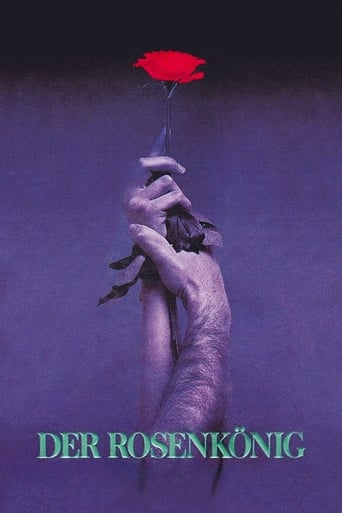



This Movie Can Only Be Described With One Word.
I was totally surprised at how great this film.You could feel your paranoia rise as the film went on and as you gradually learned the details of the real situation.
View MoreWatch something else. There are very few redeeming qualities to this film.
View MoreIt’s sentimental, ridiculously long and only occasionally funny
View MoreA vastly different take on depression, perception and emotional growth.Admittedly, not an easy watch, however, please bear with me here and try.Try to go in with an open mind and watch this film, not as an effort to a coherent narrative, but as a moving painting trying to immerse you into a scattered, unfinished emotive state which you have to complete with your own impressions.It will take some work but if you can look past certain rather viewer-taxing techniques on Schroeter's part, this exercise in patience will very quickly result into something you will, at the very least, forever remember.
View MoreMagdalena Montezuma, star of the film, muse of Werner Schroeter, died 14 days after the filming in Portugal wrapped in 1984. The film is a requiem for her, everyone involved knew she was dying from cancer (discovered in 1982), and she apparently had wanted to die on set. The only professional review I can find from the time slaps it with the emperor's new clothes stamp, seemingly unaware of any context, and whilst Schroeter makes few concessions to the critics, it is actually a fantastic film in my view. It has the dramatic feel of opera, and seems to be about art, religion, lust and love all being dead ends, or at least they were for the characters. There is a quotation of a fragment of Poe's poem City in The Sea, which is about a city that death rules over sinking and being replaced by Hell. It feels very apt up against the creepy rose farm by the sea full of ghastly beauty and fatalistic characters. Only a letter addressed to a location in Portugal provides any clue to the location being in Europe as opposed to Brazil, or Atlantis. Unlike the poem, it's clear that life will continue after the events end, as shown by the band of local children. But this is not an optimistic note as the children seem ignorant and cruel. With some graphic lingering gore, full frontal nudity, scenes of perverse animal cruelty, and with scant regard for the casual viewer, The Rose King is not for everybody, and has pretty much sunk without trace. I'll remember it for its sporadic ecstasies of light, and for its incredible emotional darknesses. The movie left me in pleasant lassitude as do many films which handle depression well.
View MoreWerner Schroeter's movies are known to be difficult to approach, at least if one comes from the background of literature-based film theory and searches for subject-predicate structures, topic-comment distribution or the connection of stereotypes. All these strategies have in common that they are based on 2-valued logic which imitates the physical schema of cause and effect in language. Although many film makers have tried to replace these rationalist structures by associative structures, the material has been proved rather stubborn, and we are today still heaven-wide distant from even the basics of a theory of associations which goes beyond the rather primitive, behavior- based fundamentals of the psychology of the early 20st century.However, as Schroeter continues to prove, it is well possible to develop whole narrative structures which are not based on rationalist preconditions. An important procedure in "Der Rosenkönig" (1986) is the use of metaphor and ritual and to create a semiotic-based double world, starting from Pre-Illumination concepts. While surrealism, as the term correctly predicts, starts with reality which is transcended (by usually reality-based methods), the semiotic worlds of Schroeter are not found in the reality of objects, but, in the opposite, the reality of objects are found in the semiotics of associative systems. Not the object and its reality are primordial, but the sign and it thematics. If somebody would have the capacity to extract a metaphysics of how Schroeter actually creates (and not depicts) reality, we would have a theory of a new world that would deserve its name. A world in which the word is substituted by a metaphor and the objective acts are substituted by rituals. (Needlees to say that in the letter device Schroeter goes way beyond Pasolini whose later work may have been Inspiratory for "Der Rosenkönig" as the Rose-King himself plays one of the victims in Pasolini's "Salo".)
View MoreThe IMDb classifies the genre of the film as Drama/Musical, but "Pretentious Nonsense" is probably a more accurate characterization, even if this is a little unkind. The film is certainly pretty to look at; each scene is (visually) as carefully composed as an oil painting, and the slow pace combines these images to an overall impression that is not unlike visiting an art gallery, i.e. moving from picture to picture, pondering over each for a while.The classical music accompanies this well and enhances that emotion, and the characters' movement have a certain balletic quality that fits to the mood.However, that alone does not make a movie. There is barely a story extractable from the proceedings, and the personal relationships between the characters do not ring true, not physically, not emotionally; they are just weird. Ballet has similar difficulties when it tries to tell its audience a story, but there is little justification for maintaining this difficulty at the cinema, just for the heck of it.The film is certainly watchable, like a piece of art, and is in this sense a vast improvement over Schroeter's dreadful "Das Liebeskonzil", but it does not engage the audience. In other words: for toffee-nosed elitists only.
View More